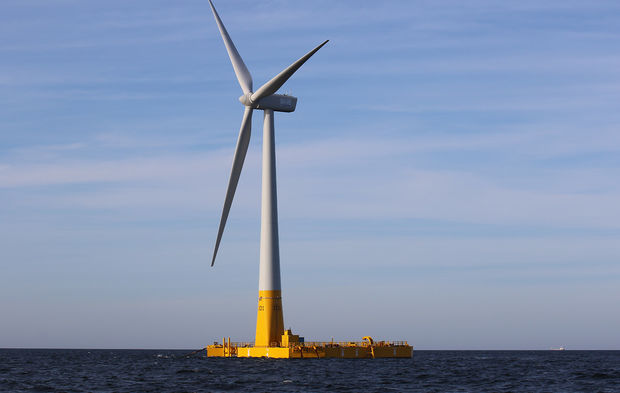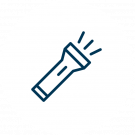
Background
Marine Renewable Energy (MRE) is a priority for the development of the Pays de la Loire Region, given the presence of large historical contractors, dynamic SMEs, recognized know-how in the marine and industrial sectors related to MRE and the presence of a unique density of recognized education and research centres. The entire value chain is covered regionally, with strong complementarities with Brittany Region. The ecosystem of Pays de la Loire has a positioning on the complete cycle of MRE (design, manufacture, operation, dismantling).
Two priority levels are defined for the Roadmap of WEAMEC :
ROADMAP OF WEAMEC – Priority 1 :
Themes with a priority 1 are strategic development issues for a critical mass of academic and industrial partners of the territory, driven by a national and / or international dynamic.
-
-
- Focus of WEAMEC tools for research and innovation support (call for projects, thematic focus groups, etc.)
- Strategic use of National and European tools (call for projects, working groups, lobbying, etc.)
-
ROADMAP OF WEAMEC – Priority 2 :
Themes with a priority 2 provide activity to academic or industrial partners of the territory by enhancing their skills.
-
-
- Use of National and European tools depending on opportunities
- Less priority on WEAMEC tools in case of competition with Priority 1 projects.
-
Research and Innovation Roadmap of WEAMEC :
Priority 1 :
- Reduce LCOE (Levelized Cost of Energy) :
- of offshore wind energy, by increasing power and size of wind turbines, and in particular in extreme and complex conditions (hard soils, high amplitude waves, etc.),
- of floating wind turbines (including “kite”, autonomous floating system for far offshore, …) and floating substations.
- Advancing wave energy by breaking concepts, and/or by coupling with other sources of energy, for offshore energy self-sufficiency applications, or supplying sites not connected to the grid.
- Amplify the strong skills of the ecosystem and bring the effort to innovative key cross bricks :
- Amplify the development of some strong skills of the ecosystem :
- Multiphase modeling coupled with parks and structures at sea (resources / aerodynamics / hydrodynamics / mechanics / soil / electric),
- Advanced control systems,
- Geotechnical and marine geophysics,
- Materials (composites, concrete, metal): advanced technologies of production and behavior in marine environment. Associated modeling.
- Bio colonization of marine structures (modeling, characterization, sea trials, …),
- Monitoring the evolution of structures at sea, correlated with environmental conditions, and associated maintenance strategies,
- MRE structures/ship collisions
- Logistics from the port to the sea
- Humanities and Social Sciences for the sharing of uses, co-activities and acceptability of MRE technologies
- To focus on key components with high added value allowing a transfer to the regional industrial stakeholders
- Advanced tools for engineering (machines and farms – design, manufacturing and logistics),
- Mooring systems,
- Dynamic cables and electrical connection,
- Metal structures, composites and concretes (fixed, floating, blades, …)
- Energy storage devices and power quality management,
- Coupling to H2 energy carreer (électrolysis, storage at sea) and/or e-fuels,
- Characterization of sites (resources and impacts), and monitoring structures at sea,
PrioritY 2 :
Take a lead on less mature MRE technologies, such as:
- Tidal energy,
- OTEC,
- Wave energy for grid-connected applications,
By valuing the skills of the WEAMEC ecosystem with national or international leaders.
For each of these priorities, an analysis of the International, French and Regional contexts was conducted to support the choices made.
It follows:
5 challenges on the Research theme:
- Modeling and multi-physics simulation and systems approaches: oceanic and meteorological, mechanical and physico-chemical simulations (materials, …), fluid-structure-soil coupling modeling, virtual reality for maintenance, global modeling of the network resource, approach system, optimization.
- Experimentation of the reduced model with the prototype: experimental databases, physical and experimental modelizations of components or complete systems (reduced models and in situ), for the entire value chain, including the transport & installation and operation & maintenance phase.
- Assessment and control of environmental and societal impacts: descriptors of MRE impacts, observation and monitoring of the environment, integration of the human and social sciences, etc…
- Control of risks, reliability, exploitation and life cycle: solicitations, instrumented structures, auscultation, reliability and life cycle, data processing, …
- Advanced materials and MRE structures: choice of materials, manufacturing processes, materials reliability, dismantling, recycling.
6 challenges on the Innovation theme :
- Characterization of the environment and the resource: resource evaluation, soil characterization, choice of location, wake effect, choice of architecture in the upstream phase, environmental impact studies, etc…
- Modeling, simulations and experiments for the study of the technological and economic model of production: upstream architecture, study of fluid coupling structure / loadings, physical modeling, mechanical simulation, simulation, mesoscale, reduced scale and full scale experiments , …
- Optimization of production processes (Factory of the future) and choice of materials
- Connection and integration to the grid: knowledge and methods for calculating hydrodynamic forces on underwater equipment including dynamic cable, substation infrastructure, storage, etc.
- Methodologies and numerical models for supply chain, port logistics and offshore installation, both during the installation of the parks and during the operation phase including maintenance / repair / exchange of large components.
- Methods and tools for risk management and monitoring, instrumentation, monitoring, control.

